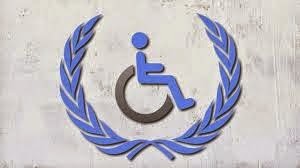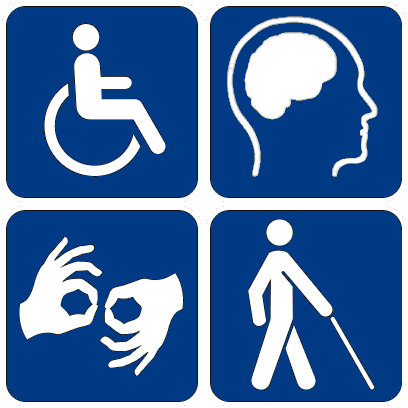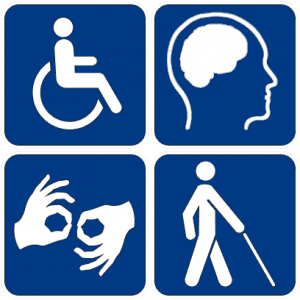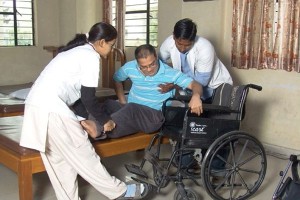In this blog post, Sreeraj K.V, a student of Government Law College, Ernakulam, Kerala writes on the laws that safeguard the rights of the disabled in India. The blog post discusses the discrimination faced by the physically challenged people, the various legal remedies available to them as well as an analysis on Rights of Persons with Disabilities Bill, 2014.
Disability in India
India is the largest democracy in the world. It includes rights of citizens in every sphere of life. In such a context, the term ‘citizen’ includes each and every person who is born in India. Persons with a disability also come under this term. But the real fact is that the persons with disability in India are treated in a very disappointing way resulting in their basic rights as the citizens of this country being hampered. It has been stated by various persons dealing with such matters that around 70 million people in India are disabled in one way or the other. Such persons are forced to confront segregation, discrimination and stereotypes.[1] Even though there are certain laws and statutes in favour of the disabled in India, such as the Persons with Disabilities Act, 1995, Mental Health Act, 1987, The Rehabilitation Council of India Act, 1992 and also National Trust for Welfare of Persons with Autism, Cerebral Palsy, Mental Retardation and Multiple Disabilities Act, 1999[2], the impact of such statutes in our society is very less because of the prevailing socio-economic condition of our society.
The Constitution of India provides certain rights for the citizens of India, mainly fundamental rights which are enumerated under Part III of the Constitution. Same rights are available for the physically challenged people as well or rather a bit more when compared to normal citizens. The central as well as the state governments have implemented various schemes and policies for the physically challenged people to uplift them in the society. Apart from this, laws and statutes of our country provide certain special rights to them so that they stay away from all such discrimination as well as inhuman activities.
Discrimination faced by the disabled
There is some forms of discrimination that the physically challenged face right from the time of birth.
- Lack of educational opportunities at primary and higher levels.
- Lack of employment opportunities.
- Lack of access to the built infrastructure.
- Lack of information in their accessible formats.
- Denial of rights to promotion and payment during employment.
- Denial of reasonable accommodation, education, and employment.
- Denial of access to various civil/political rights.
- Discrimination faced by physically challenged women.[3]
United Nations and the physically challenged
United Nations has seriously intervened i n the matters concerning the physically challenged people and their empowerment in their society. Various plans have been implemented so that such people will not be isolated from the society and they will be able to contribute to their own development. Such plans include:
n the matters concerning the physically challenged people and their empowerment in their society. Various plans have been implemented so that such people will not be isolated from the society and they will be able to contribute to their own development. Such plans include:
- People with disabilities will have same rights as other human beings have.
- They are to be provided with proper medical, health care facilities so that they will be able to develop in their life and attain maximum potential.
- Right to economic security and decent standard of living.
- Right to live with his/her family and participate in various activities of the community.
- Right to a qualified guardian for his/her personal assistance and well-being
- Right against exploitation, abuse, and degrading treatments.
- Whenever a physically challenged person is not capable of enforcing his/her rights, there must be proper procedure for enforcement or such denial must be based on an evaluation by socially qualified experts.[4]
Persons with Disabilities Act, 1995
This Act, popularly known as the PWD Act, has been enacted by the legislature to provide certain empowerment as well as some special rights to the disabled as compared to other people. Chapter I deals with certain important definitions like disability, blindness, hearing impairment, etc. Chapter III deals with the importance and implementation of various committees such as State Co-ordination Committee to look after the matters concerning physically challenged people in various States. Chapter IV deals with the prevention and early detection of disabilities whereas Chapter V looks into the educational needs of the physically challenged. The chapters preceding include various provisions regarding employment, affirmative actions, non-discrimination, recognition of various institutions for physically challenged people, authorities concerned, as well as provisions concerning the social security of the physically challenged. All such provisions are being enacted to make them equal to the other common citizens of the country. The Act strictly looks into various issues wherein any physically challenged person is being discriminated against or harmed in the society.
There are many landmark judgments on the right of the disabled, both from the Supreme Court as well as various High Courts. In Deaf employee’s Welfare Association v. Union of India[5], the Supreme Court held that “there cannot be discrimination between people with blindness as well as people with hearing impairments. Equality before the law and equal protection of law has to be afforded to persons with disabilities while participating in Government functions. It was also held that dignity of such persons must be ensured by the State. Such people must also be given certain transportation allowances at par with other physically challenged people working under the Government.”
Rehabilitation
Even though there are many laws and landmark judgments for the physically challenged people in India, those people are strictly in need of various rehabilitative measures for their betterment. Such methods have been adopted by the Rehabilitation Council of India Act, 1992 wherein, it imposes various guidelines to treat such people with impairments. Such guidelines include:
- Right to be served by qualified rehabilitation professionals who are registered under the Council.
- To have a guarantee of minimum standard of education for recognition of rehabilitation qualification by universities or institutions in India.
- To have guarantee of minimum code of conduct and professional ethics by rehabilitative professionals.
- To have a guarantee of regulation of the profession of rehabilitative professionals by a statutory council under the control of the Central Government. [6]
Rights of Persons with Disabilities Bill, 2014
This bill was introduced as a replacement of the Persons with Disabilities Act, 1995. For that, a committee was set up by the Ministry of Social Justice and Empowerment. The bill clearly defines as to what is clearly meant by the term disability. A person will be treated as disabled if he shall suffer 40% disability. The bill includes various provisions to prevent physically challenged persons from any harassment while obtaining a disability certificate and also lays down strict punishment for the people who violates the provisions. The bill also provides other provisions such as the formation of National Commissions for the persons with disabilities. On the whole, the bill enhances various new provisions in the field of disability as well as for persons with disabilities. The bill also ensures maximum rights and freedom for the disabled people, not as a separate section of the society but as one among the society itself. The bill also makes certain sub-divisions within the term ‘disability’ so that nothing will be missed out. The bill also contains various other provisions which were derived from the UN conventions for the rights of the physically challenged. [7]
Conclusion
Various experts give a new definition to the term disability as well as a new dimension to the enforcement of rights of the physically challenged. That the term ‘disabled people’ has to be changed into ‘specially abled’ or ‘diffently abled’ so that the meaning of the term will change from negative to positive. This will be one of the first and finest steps towards the empowerment of the physically challenged people in our country. Various state governments have also implemented various schemes and policies in favor of physically challenged people such as creating a friendly environment for them mainly in government offices, providing space for them in every sector of daily life, providing an easy environment for them to move around without anyone’s help, etc. Such changes make a huge difference in the attitude of the people in such a way that they accept such differently abled people as one among themselves.
Footnotes:
[1] Retrieved on: http://www.hrln.org/hrln/disability-rights.html
[2] Retrieved on: http://vikaspedia.in/health/mental-health/guidelines-for-parents-of-children-with-disabilities/legal-rights-of-the-disabled-in-india
[3] Retrieved on http://www.hrln.org/hrln/disability-rights.html
[4] Retrieved on: http://vikaspedia.in/health/mental-health/guidelines-for-parents-of-children-with-disabilities/legal-rights-of-the-disabled-in-india#section-24
[5]Deaf Employees Welfare Association v. Union of India WP (C) 107 of 2011
[6] Retrieved on: http://vikaspedia.in/health/mental-health/guidelines-for-parents-of-children-with-disabilities/legal-rights-of-the-disabled-in-india#section-24
[7] Retrieved on: http://blog.ipleaders.in/rights-of-persons-with-disabilities-bill-2014-a-review/
 Serato DJ Crack 2025Serato DJ PRO Crack
Serato DJ Crack 2025Serato DJ PRO Crack













 Allow notifications
Allow notifications



[…] Must Read: Laws Catering to the disabled in India […]